Gen. Hayden Examines Tumultuous Year, Future
By
Westmont
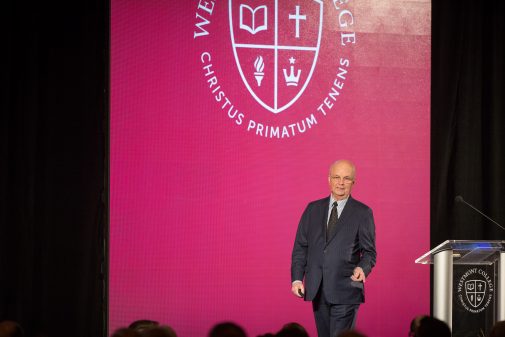
Gen. Michael Hayden, an expert on domestic and foreign affairs and a retired director of the Central Intelligence Agency and National Security Agency, offered his personal lens to view our complex and dangerous world at the 13th annual Westmont President’s Breakfast on Feb. 9 at Fess Parker’s DoubleTree Resort. The sold-out crowd of about 625 guests included dozens of local emergency and government officials who received thanks from President Gayle D. Beebe and a standing ovation following a brief video of Professor Tom Walters’ experience evacuating from the Montecito mudslide.
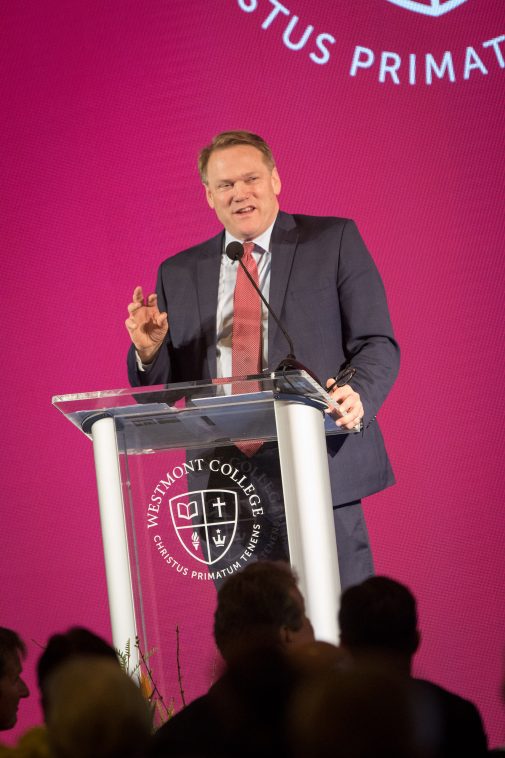
Hayden, a retired four-star Air Force general who was the nation’s highest-ranking military intelligence officer, said how uplifting the community has been in the wake of the tragedy. “I’m the intel guy,” he said. “I never bring good news. I have nothing uplifting. I’m the guy who leaves you worried at the end of the presentation, and I promise to not disappoint.”
He started by outlining a way of thinking about all the data that constantly barrages us. “As bad as the world seems right now, most of the people in this room have lived in a more dangerous time,” he said. “But we’ve never seen it more complicated and more immediate.”
He calls 2017 the year of disruption due to the United States shocking its foreign partners by markedly changing direction in its policies and beliefs, such as the North American Free Trade Agreement, Trans Pacific Partnership, Paris climate agreement and the Iran nuclear deal. “Vote however you want, but that’s a lot in the first 12 months of the administration, and we’re not done,” he said. He also mentioned the president’s lack of support for NATO’s Article 5, moving the U.S. embassy in Israel to Jerusalem and the Muslim travel ban. “That’s a different image of America than ‘give us your poor, your tired, your huddled masses,’” he said.
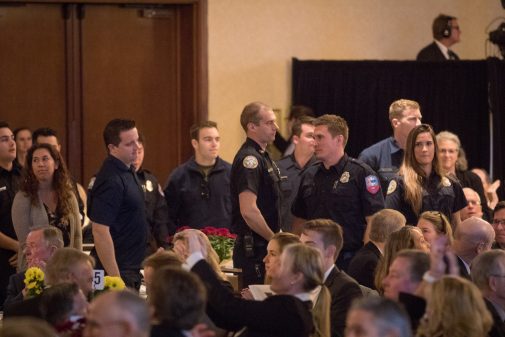
There have also been changes in foreign policy strategy in Syria and North Korea, the supplying of arms to the Ukrainians and the Islamic State being defeated at the capital of Raqqa.
“If 2017 was the year of disruption, 2018, I think, is the year of consequences. We’ve lit three or four fuses. Those fuses are going to burn in 2018, and I think some of them are going to hit powder.”
He identified one of those fuses as North Korean leader Kim Jong Un. “He is a bad man, but he’s not crazy,” he said. “He is coldly rational, and what the North Koreans are doing is exactly what a logical actor would do in his circumstances. He would be crazy if he were to give up his nuclear weapons because they are the only thing that guarantees the survival of not just his government but of him and his family.”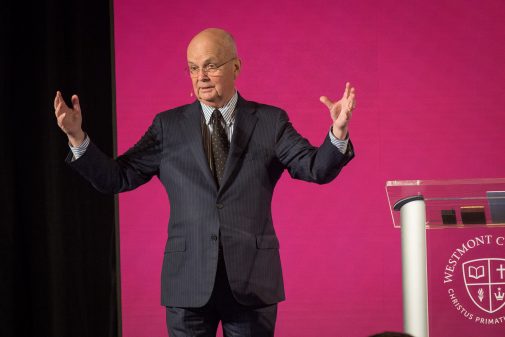
He backed this claim by mentioning that both Saddam Hussein and Muammar Gaddafi did not have nuclear weapons and were killed by the U.S. “And the short subject in between was called the Ukraine,” he said, “who you’ll remember in the 1990s gave their nuclear weapons back to the Russians in return for territory guarantees in perpetuity. He (Jong Un) sees what happens when you don’t have this stuff. He’s never going to give that up. The problem is that our president says he’s got to.”
Another fuse, according to Hayden is Iran, which has dismantled most of its nuclear program for the lifting of sanctions as part of the Iran nuclear deal. “President Trump seems the most enthusiastic about foreign policy when he can undo something his predecessor did,” he said.
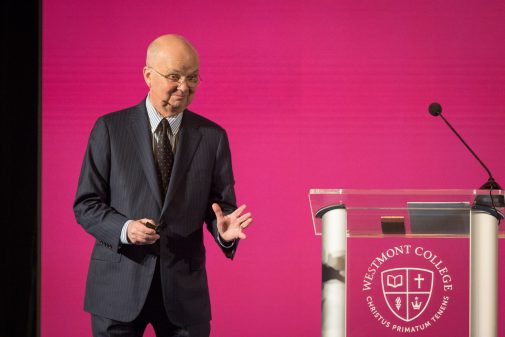 Hayden added other concerns about Iran, including an aggressive expansion into the territories of Iraq, Syria and Lebanon. “The American success in defeating ISIS has created circumstances for the Iranians to come in behind us and expand their control of those areas,” he said.
Hayden added other concerns about Iran, including an aggressive expansion into the territories of Iraq, Syria and Lebanon. “The American success in defeating ISIS has created circumstances for the Iranians to come in behind us and expand their control of those areas,” he said.
He shared some positive news about terrorism. Hayden explained we’re relatively safe, stressing the limits in the amount of damage terrorists can inflict as well as the limits to the intelligence community’s abillity to prevent an attack.
Lastly, Hayden examined Vladimir Putin and Russia, defining the country as a revanchist rather than a resurgent power. He downplayed their importance (Russia’s gross domestic product is half the size of California’s), while noting their nuclear arsenal.
Hayden, an expert on cybersecurity, examined Putin’s motives and the steps taken to interfere with the U.S. presidential election, including the stolen emails from the Democratic National Convention sent to WikiLeaks and other sources then used by Russian bots and computer farms to push the messaging to social media and the news.
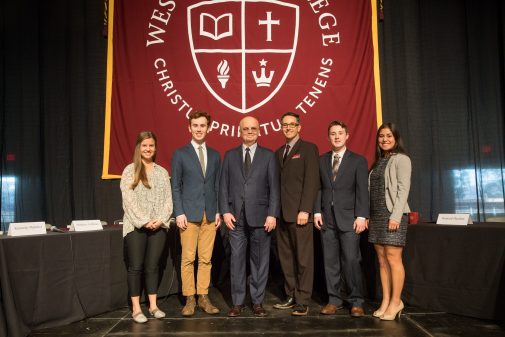
He examined more recent American social media trends, highlighting a period when #releasethememo was by far the most popular topic. “That gets picked up by the alt-right media in this country,” he said. “There is an amazing parallel to the Russian bot nets and the alt-right media. It’s on display, then Sean Hannity picks it up on his broadcast, the most popular show on cable news, and then it gets picked up by “FOX and Friends” the next morning, and guess who tweets that everyone should believe it? That’s the Russian influence.”
U.S. officials have not been able to agree that the Russians are messing with the nation in a way that disrupts American democracy. “If you don’t believe me, channel surf tonight FOX, CNN and MSNBC, and you’ll get it,” he said.
Hayden reminded the audience that former FBI Director Robert Mueller will release his report on the Special Counsel Investigation this year. “No matter what director Mueller determines, it will be explosive,” Hayden said. “No matter which way he goes, how big, how small, how against, how for, it will be an explosive item inside America.”
In conclusion, Hayden asked if we can all agree it’s bad foreign policy to become unpredictable to our friends and allies. “In 20 years, we’ve gone from a bipolar world to a bipolar superpower,” he said. “You need to fret about North Korea. You need to fret about Iran. You need to fret about terrorism. You need to fret about the Russians. But most of all, you need to fret about America. We’ve got to have an adult conversation with ourselves to reach a national consensus about how America should think about and what America should do about all those things we see out there.”
Filed under
Academics, Admissions, Alumni, Campus Events, Faculty and Staff, Featured, Giving, Lectures, Press Releases, Student Stars